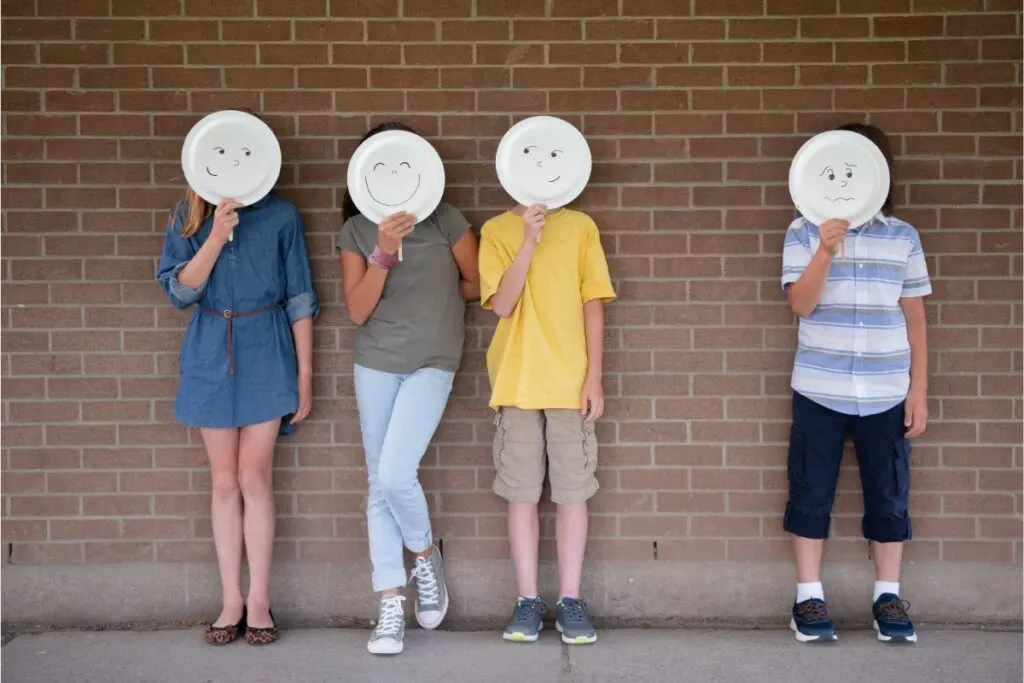Working on Social Emotional Learning (SEL) from an early age sets children up to be more rounded and aware adults.
The type of SEL activities you do with your class will depend on their age, but you can tailor many tasks for different student groups.

Below, we’ve included some interesting ideas for SEL activities to develop social skills for students of different ages.
Let’s get into it.
SEL Activities For Preschool (Ages 3-5)
First, let’s start with the little ones. Teaching them SEL skills at this age can support them as they grow and learn to express their feelings.
1. Feelings Faces
Have children draw or choose faces depicting various emotions.
Discuss the situations that might cause these feelings.
2. Story Time Sharing
After reading a story for circle time, ask children how certain characters might have felt and why.
Encourage them to relate it to their own experiences.
3. Turn-taking Games
Simple board games or group activities like rolling a ball back and forth help teach patience and sharing.
Role-Playing
Have children act out various scenarios to teach empathy, problem-solving, and perspective-taking.
3. Color Your Emotions
Provide children with a blank body outline and colored pencils or crayons. Ask them to color where they feel certain emotions in their body.
For instance, “Where do you feel happy?” might be colored yellow in the chest area.
4. Circle Time Sharing
Begin or end the day with a sharing circle where children can talk about something they’re excited about or something that made them sad.
5. Music And Emotions
Play different types of music and ask children to dance or show how it makes them feel.
Discuss the feelings afterward.
6. Mirror Expressions
Make faces expressing various emotions and have children mimic them using a mirror.
This task will make your preschoolers laugh, but it will also get them focused on human emotions.
7. Puppet Play
Allow children to use puppets to act out scenarios, helping them express feelings or resolve conflicts indirectly.
Elementary (Ages 6-10)
Moving onto elementary-age students, we can start to introduce SEL activities that are a little more advanced:
1. Group Storytelling
As a group, tell a collaborative story where each student adds a sentence or two.
This fosters listening skills and cooperative storytelling.
2. Compliment Chain
Encourage students to share genuine compliments about another student.
This promotes positive communication and boosts self-esteem.
3. Emotion Charades
Have students act out different emotions without using words while others guess the emotion.
This enhances emotional recognition and builds upon the skills they learned in preschool.
4. Problem-Solving Scenarios
Present students with hypothetical situations where they must discuss and decide on the best solution.
This encourages your students to socialize while listening to the opinions and input of others.
5. Gratitude Journal
Encourage children to write or draw three things they’re thankful for each day.
This is a positive tactic for managing their mental health – and it’s a skill they can take into later life.
6. Emotion Thermometer
Create a thermometer visual to help students indicate their emotional state.
Discuss coping strategies for when they’re “running hot.”
This is particularly useful if you have anyone in your class who struggles to talk about their emotions.
7. Friendship Bingo
Design bingo cards with squares like “Find someone who has a pet” to encourage children to get to know their peers better.
8. Breathing Exercises
Teach students various breathing techniques to calm down when feeling overwhelmed or anxious.
They may feel silly at first, but they’ll soon come to appreciate that it helps them to feel better.
9. Kindness Tree
Create a tree mural where leaves are added each time a student performs an act of kindness.
This is a beautiful task that will lead to a more caring atmosphere in your class.

Middle School (Ages 11-14)
Emotions become more complex as students reach middle school, thanks to their changing hormones.
Giving them SEL activities can help them to adjust.
1. Conflict Resolution Role Play
Present various scenarios for students to act out and resolve.
Discuss the outcomes and alternative solutions.
2. Journaling
Encourage students to write about their feelings, challenges, and triumphs.
This promotes self-reflection and emotional processing.
Not all students will take to this activity, but some will and may even continue this outside of school.
3. Team-Building Challenges
Activities such as obstacle courses or group projects that require collaboration, communication, and leadership help to build social skills.
4. Emotion Wheel
Create a wheel with various emotions.
Have students spin it and share a time they felt that emotion and how they handled it.
Getting your middle schoolers to open up in front of their peers like this encourages positivity around sharing emotions and listening to others.
5. Goal Setting
Allow students to set academic or personal goals, create a plan to reach them, and reflect on their progress.
Other students can offer helpful advice on how they can reach their goals to foster collaboration.
6. Book Club
Choose books that deal with various social and emotional challenges and host discussions.
7. Identity Collage
Encourage students to create collages that represent who they are, promoting self-awareness and acceptance.
Have them present them to the rest of the class to encourage your students to appreciate diversity and individuality.
8. Community Service Projects
Engage students in projects to help the community, teaching empathy and responsibility.
9. Peer Appreciation Day
Designate days where students can write anonymous notes of appreciation to each other.
You can create a box in the classroom where students can post these notes.
They can either be handed to the recipient or read out to the rest of the class so everyone can appreciate the kindness.
High School (Ages 15-18)
By high school, children should have a good understanding of their emotions and the emotions of others.
However, they are still developing into young adults, and hormones are still raging, so SEL activities can help them become more well-rounded human beings.
1. Peer Mediation Training
Train students to help mediate disputes among peers. This encourages active listening, empathy, and conflict resolution.
It’s a useful skill that will serve them well into adulthood.
2. Group Discussions On Current Events
Foster discussions on societal and global issues, prompting students to understand and respect diverse perspectives.
3. Career Role Play
Allow students to assume roles in various professions and interact, emphasizing communication, collaboration, and professional etiquette.
4. Mindfulness And Meditation
Introduce practices that focus on present-moment awareness, stress reduction, and emotional regulation.
5. Socratic Seminars
Engage students in deep discussions about philosophical or ethical questions, fostering critical thinking and perspective-taking.
6. Stress-Relief Workshops
Introduce various methods of stress relief, such as yoga, art therapy, or guided relaxation.
7. Real-world Budgeting
Teach students about finances, budgeting, and fiscal responsibility, preparing them for real-world challenges.
8. Peer Mentoring Programs
Connect upperclassmen with younger students to provide guidance, advice, and support.
This is good for your student’s resumes, but it also fosters communication and understanding.
9. Personal Development Plans
Encourage students to assess their strengths, weaknesses, passions, and goals to plan for the future.
In Summary
SEL activities to build social skills are beneficial for children of all ages.
Tailoring the tasks to the age group allows each child to get the most out of the lesson.
Understanding their own feelings gives children more appreciation and confidence in social settings and helps them grow into adults who are adept at managing their emotions and understanding how other people feel and behave in different situations.
- Homeschooling In High School: Pros And Cons - February 24, 2024
- How Do I Withdraw My Child From School To Homeschool? - February 23, 2024
- How To Not Go Crazy Homeschooling Kids: A Guide For Frazzled Parents - February 22, 2024









Leave a comment